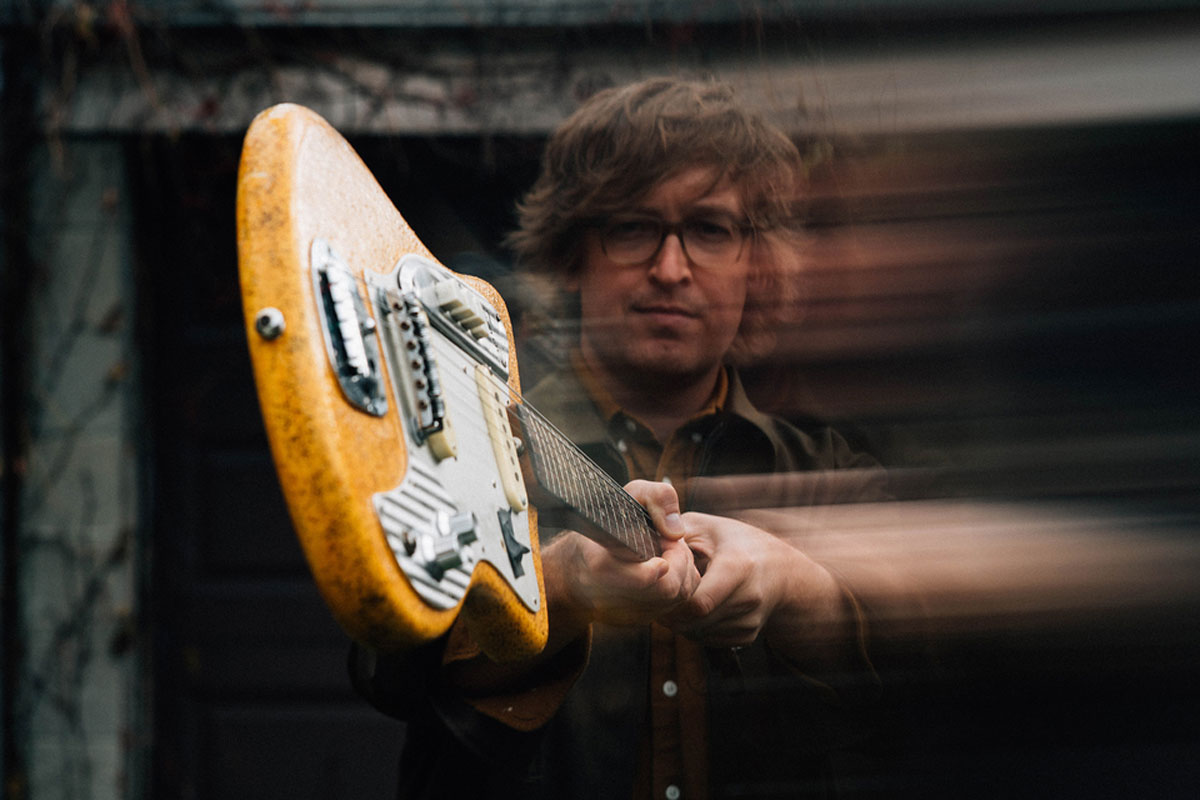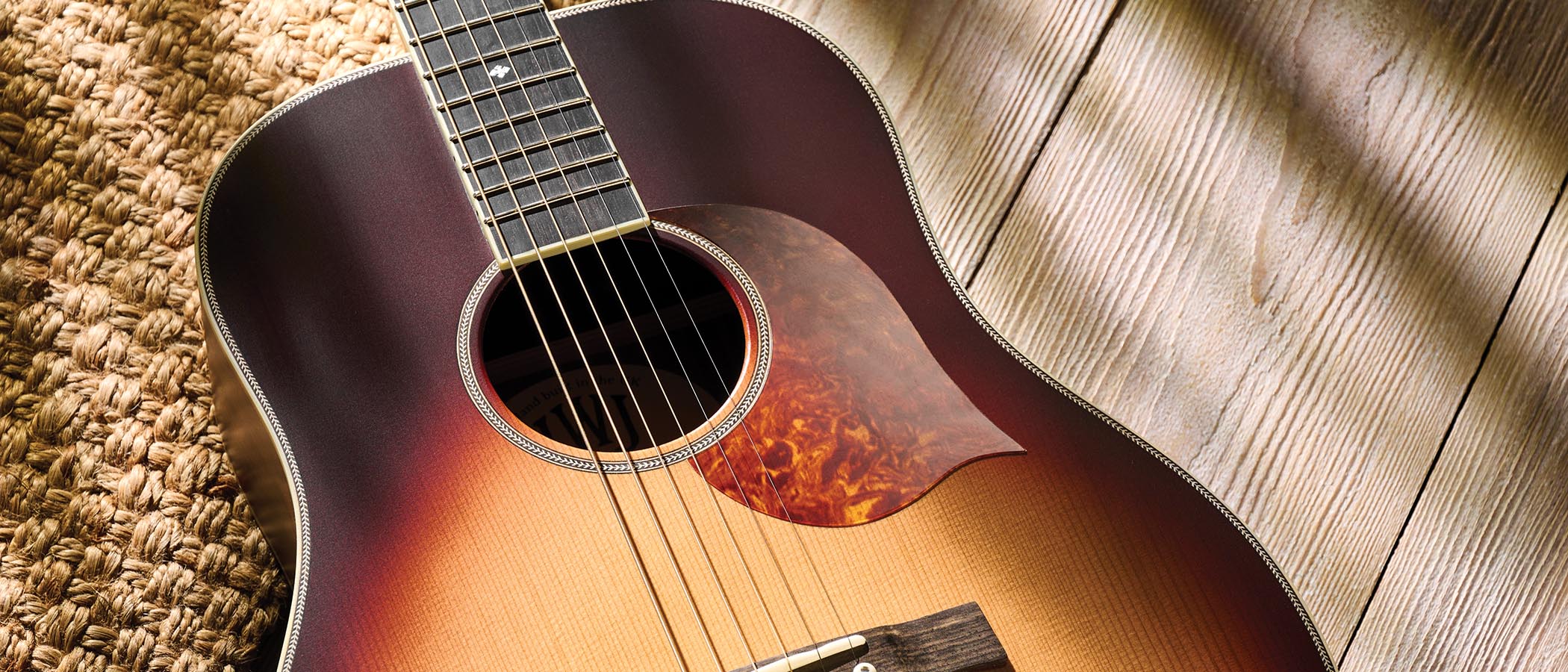Alex Edkins: “I was open to getting basic with Weird Nightmare – I was like, ‘Oh, an open D chord? That feels awesome!’ I hadn’t done that in 10 years”
The Canadian alt-rocker talks embracing traditional rock and pop tropes on his self-titled Weird Nightmare debut, and how the METZ fan community came together to support the band after the theft of their gear last year

All the latest guitar news, interviews, lessons, reviews, deals and more, direct to your inbox!
You are now subscribed
Your newsletter sign-up was successful
One of the most radical things Alex Edkins does on his self-titled debut as Weird Nightmare is revel in the simplicity of an open D chord. Since 2008, the Toronto-based guitarist has cloaked the underlying melodies of his longtime METZ project with panic-locked six-string dissonance and a chimerical burst of fuzzes and delays.
By contrast, early Weird Nightmare single Lusitania is a jubilant, jangle-heavy rave-up that pays homage to Edkins’ love of both the British Invasion and ‘90s-era hooks from the likes of Guided By Voices and The Amps.
As he prepped the 10-song debut from home at the beginning of the pandemic, embracing “traditional rock/pop tropes” felt profound.
“It was just reminding me that this whole thing doesn’t have to be complicated,” Edkins says of mining influence outside of METZ’s wheelhouse. “I was like, ‘I’m just going to do a two-chord song.’ That was so exciting to me. The strangest thing for me was to not do the challenging thing.”
Other comparative irregularities include the METZ guitarist going bluegrass for the album’s gentle Zebra Dance, while the echo-spurting trills that drive its closing Holding Out sound as if they’re being transmitted from an underwater sock hop.
Still, Weird Nightmare’s debut isn’t afraid to occasionally get as in-the-red as METZ. Take Dream, a vibrantly sun-warped shoegaze number nearly upended by an off-the-cuff lead of uncouth bending.
Edkins adds with a laugh, “It’s funny: when I say that I made a pop record most people would think, ‘Listen, my friend, that is not a pop record,’ but to me it is! That was my intent.”
All the latest guitar news, interviews, lessons, reviews, deals and more, direct to your inbox!
Speaking with Guitar World, Edkins further elaborated on the revived riffs, janky guitars, and pop-celebrating chord choices of his Weird Nightmare.
It's not that melody hasn’t been a part of METZ this whole time, but when did you realize you wanted to make something arguably a little more joyful-sounding?
“I’m really drawn to pop music, and when I say that, I’m coming from a place like the Beatles, the British Invasion, and garage rock. That kind of stuff is near and dear to my heart; I love how straight-to-the-point it is, and how it’s focused on melody and hooks.
“When the pandemic hit, it took [METZ] off the road. My son, who was four at the time, couldn’t go to school, so I would stay home with him and help him through his online schooling, [but] then after that I was like ‘Man… I need an [artistic] outlet.’
“I would spend my nights alone at the METZ rehearsal spot recording for hours on end, and this Weird Nightmare record is what came out. I’m not going to question it, or second-guess why this happened. I was really into fun, catchy, poppy music at that time – I still am.”
Was there a specific moment in the practice space where the songs officially became the Weird Nightmare project?
“Maybe the song Lusitania was something where I went, ‘That feels totally like me, but also totally new.’ It was embracing all these traditional rock/pop tropes. I was using barre chords and open chords that I’d never dreamt of using in METZ – METZ has its own universe of what I would like to think are invented chords.
METZ is more about fighting against certain traditions in music; Weird Nightmare is embracing them
“I was totally open to getting basic [with Weird Nightmare]. ‘Oh, an open D Chord? That feels awesome!’ I hadn’t done that in 10 years.
“It was liberating to do the easy thing. That was never what METZ was about. It still isn’t. That’s more about fighting against certain traditions in music; this was embracing them.”
Thinking outside of those chord choices, were there any significant shake-ups in your general gear setup?
“There were a number of guitars: I had a ‘60s Silvertone 1457 that has a nice kind of twang, and I used a Rickenbacker 330. I was trying to avoid the stuff that I would naturally go to for METZ, and more simplistically [I was] just gaining down. It’s not as saturated, because I’ve done that before.
“That being said, a song like Nibs is probably the most distorted thing I’ve ever made. That's a Death by Audio Waveformer Destroyer cranked, and maybe direct – it’s absolutely gross.
“In a lot of the press photos I’m holding an old Japanese Zenon that I had used on one METZ song called Drained Lake [off 2017’s Strange Peace]. It’s a really janky-sounding guitar, but I used it quite a bit on this record. I would mic the strings of the electric guitar, too, in order to get that sort of percussive, acoustic-sounding thing. You can hear that on Searching For You at the beginning of the record.”

How did you come across that Zenon?
“There’s a Facebook group in Toronto called All Buttons In where you sell and trade gear. A guy put this up and it caught my eye – part of that was that it’s a home paint job. It wasn’t originally a gross, sparkly yellow. I traded him a couple of distortion pedals, simple as that.”
You mentioned the gross distortion of Nibs, but can we get into its polar opposite on the record? Your Zebra Dance is a low-key, fingerpickin’ kind of bluegrass piece. Where did that come from?
“I felt that the record needed a breather. You know how everyone sits down with a guitar and they have their thing they have to play? Like, it’s a habit. That riff is something I play all the time, so I [recorded it], put a strange little sample underneath, and the rest is my son singing joyously – I wanted to put my son on the record.”
Was that happenstance that he was singing in the background? It almost sounds like it’s unrelated to the piece, like he’s in another room.
My son is always doing something hilarious, so I used a voice memo I had of him on Zebra Dance – I felt that it somehow added to the song
“No, I’m always recording him. He’s always doing something hilarious, so that was just one of the voice memos I had [of him], and I felt that it somehow added to the song.”
Dream has maybe the biggest lead on the record, which is this especially unhinged series of bends. Did you flow off-the-cuff through that moment, or did you labor on the solo?
“That’s a funny one. That song and Darkroom were written in 2014, but were never finished. When I got back to them, [it was] one of those scenarios where you’re demoing, you just push record, and you hopefully fluke out on first takes.
“That solo is certainly first take, with all kinds of screwups and pedal switches during the solo. I was just figuring out what to do for the next take, but you fall in love with it.
“Graham Walsh, who helped me record some of the drums, was like, ‘You have to promise me that you’re not going to redo that solo,’ but I was like, ‘Are you kidding me?’ But then [METZ drummer] Hayden Menzies was like, ‘You’re going to replace that, right?’ It was immediately loved and hated.”
If some of the songs had been hanging around for a few years, had any of them gone through the METZ meatgrinder first? A noisier song like Oh No, in particular, feels like it could’ve worked with the band.
“Absolutely, that was supposed to be a METZ song but it didn’t click. A couple other ones were like that, too. That being said, they weren’t worked on and pushed to where they are now.
“There was a time when I would fight against that – I would never give up on an idea – but I [eventually] realized that if it’s not working, there’s probably a good reason. I’m not going to try and change those guys. They’re awesome, and all three of us define what METZ sounds like.”
Since Weird Nightmare have a few shows coming up this spring, who’s in your band?
“I don’t know if you’ve heard of a band called North of America – they were an awesome math-rock band from [Halifax, Nova Scotia]. Two of those fellas, Jim [MacAlpine, bass] and Michael [Catano, drums], are the rhythm section, and I’ve got another friend playing guitar. It’s a four-piece rock band – we’re just getting in that headspace now.”
There was an outpouring of support following the theft of our gear last year – people were bringing pedals to the shows to make sure we got back on track
METZ had their trailer stolen late last year during a North America tour. You’d brought your guitars into the hotel that night, and some of what was in the trailer had been rented, but what personal bits of gear did you lose?
“Just pedals, thankfully, but we cobbled [more gear] together relatively quick.
“It’s funny how sensitive and interactive those pedals are. You take one thing out of your chain and nothing reacts the same. For me, I depend on the [Pro Co] Turbo RAT for a lot of METZ. If you give me a regular RAT and not a Turbo, it’s like day and night; it just doesn’t fire off the same way.
“That was a frustrating part about the theft, but there was an outpouring of support, and people were bringing pedals to the shows to make sure we got back on track. It really wasn’t that bad, as far as getting our sounds back.”

METZ bassist Chris Slorach had posted about one of the pedals he was given on that tour, a custom “METZ: Don’t Steal This Fuzz” pedal from Wren and Cuff. Did you get to try out any home jobs on that trip?
“Yeah, a guy made me custom distortion – shoutout to Westwood Custom Instruments. He just whipped something up, brought it to the show [in Vancouver], and it helped me get through a couple of shows. It was awesome.”
What kind of challenges have come up as you’ve been reconfiguring your rig and pedalboard setup for Weird Nightmare?
“I think I’m going to avoid my Jazzmaster completely, and play either my [Rickenbacker] or the Silvertone. With songs like Holding Out, the last song on the album, the tone was very much defined by a pedal – it was an EarthQuaker that I got for free at Levitation Fest [in Austin, Texas].
“I got home, plugged it in, pushed record, and that riff came out as a super-‘verby, delayed, fuzzy thing. It’s going to be a bit of a challenge to get the right tones [live].”
Is the Zenon going out with you?
“If it stays in tune [laughs]. I’ll give it a fair shake, and if it does what it needs to do [at practice] I’ll bring it out for sure. But I haven’t gotten around to auditioning it yet.”
- Weird Nightmare's self-titled debut arrives May 20 via Sub Pop.
Gregory Adams is a Vancouver-based arts reporter. From metal legends to emerging pop icons to the best of the basement circuit, he’s interviewed musicians across countless genres for nearly two decades, most recently with Guitar World, Bass Player, Revolver, and more – as well as through his independent newsletter, Gut Feeling. This all still blows his mind. He’s a guitar player, generally bouncing hardcore riffs off his ’52 Tele reissue and a dinged-up SG.



